10 Stocks for Socially Responsible Investors
When it began to blossom in the 1980s, "socially responsible" investing was mostly about what investors didn't want to own.


Profit and prosper with the best of Kiplinger's advice on investing, taxes, retirement, personal finance and much more. Delivered daily. Enter your email in the box and click Sign Me Up.
You are now subscribed
Your newsletter sign-up was successful
Want to add more newsletters?

Delivered daily
Kiplinger Today
Profit and prosper with the best of Kiplinger's advice on investing, taxes, retirement, personal finance and much more delivered daily. Smart money moves start here.

Sent five days a week
Kiplinger A Step Ahead
Get practical help to make better financial decisions in your everyday life, from spending to savings on top deals.

Delivered daily
Kiplinger Closing Bell
Get today's biggest financial and investing headlines delivered to your inbox every day the U.S. stock market is open.

Sent twice a week
Kiplinger Adviser Intel
Financial pros across the country share best practices and fresh tactics to preserve and grow your wealth.

Delivered weekly
Kiplinger Tax Tips
Trim your federal and state tax bills with practical tax-planning and tax-cutting strategies.

Sent twice a week
Kiplinger Retirement Tips
Your twice-a-week guide to planning and enjoying a financially secure and richly rewarding retirement

Sent bimonthly.
Kiplinger Adviser Angle
Insights for advisers, wealth managers and other financial professionals.

Sent twice a week
Kiplinger Investing Weekly
Your twice-a-week roundup of promising stocks, funds, companies and industries you should consider, ones you should avoid, and why.

Sent weekly for six weeks
Kiplinger Invest for Retirement
Your step-by-step six-part series on how to invest for retirement, from devising a successful strategy to exactly which investments to choose.
When it began to blossom in the 1980s, "socially responsible" investing was mostly about what investors didn't want to own. That typically meant shunning stocks of so-called vice industries: defense, tobacco, gambling and alcohol.
Today, socially responsible investing is largely dedicated to investing for the greater good of humankind and the planet, which means focusing on companies that have pledged to work toward those goals as part of their culture. By some estimates, $3.7 trillion of U.S. investors' capital now is invested with those SRI goals in mind, or one of every nine dollars under professional management.
We went looking for stocks that are popular with socially responsible mutual funds or that have attributes that ought to make those funds take notice. Our 10 picks represent a cross-section of industries and company sizes. None of the companies or their investors would say that being socially responsible means sacrificing investment returns. Of the nine picks that have been around for at least a decade, eight have outperformed the Standard & Poor’s 500-stock index on an annualized basis over the past 10 years. On the contrary, says Bennett Freeman, senior vice-president for sustainability research and policy at Calvert Funds in Bethesda, Md.: "We believe that attention to environmental, social and governance issues helps, not hinders, investment performance."
Take a look at our list of some of the best stocks for socially responsible investors.
Price/earnings ratios were calculated on Sept. 24, 2014, based on earnings estimates for the next 12 months. Morningstar’s data on stock ownership by 151 socially responsible equity mutual funds is as of June 30, 2014.The stocks are listed alphabetically.

Apple
- Headquarters: Cupertino, Calif.52-week price range: $67.77 - $103.74Market capitalization: $609.3 billionP/E ratio: 1710-year annualized total return: 44.5% (versus 8.3% for the S&P 500)
Apple (AAPL) ranks as the single largest stock holding of socially responsible mutual funds, with $1 billion worth of the shares in SRI portfolios. That shows the faith many of those investors have in the firm as an agent of positive change. It also reflects the stock's incredible run, which has made Apple the largest U.S. company by market value. Amy Domini, CEO of Domini Social Investments in New York and one of the founders of the SRI movement, also notes that the tech industry has a built-in advantage in appealing to socially responsible investors: "You can see the benefits of what they make," she says. "In general, there are more positives than negatives with tech."
Yet Apple has been a controversial choice for socially responsible stock funds. Social goals never seemed a high priority for Apple co-founder Steve Jobs. In 2012, the year after Jobs died, Apple faced intensified criticism about labor practices at one of its key Chinese suppliers, Foxconn. It fell to new CEO Tim Cook to ramp up efforts to improve worker safety. Also under Cook, employees at Apple's retail stores got hefty raises in 2012. Some Apple fans say the company's sheer size unfairly makes it a lightning rod for attacks on its business practices while shortchanging its social contributions. But that also gives socially responsible investors hope that Apple, under Cook, is more willing to lead by example. "We continue to believe they're on a trajectory of improvement," says Freeman, of Calvert Funds.
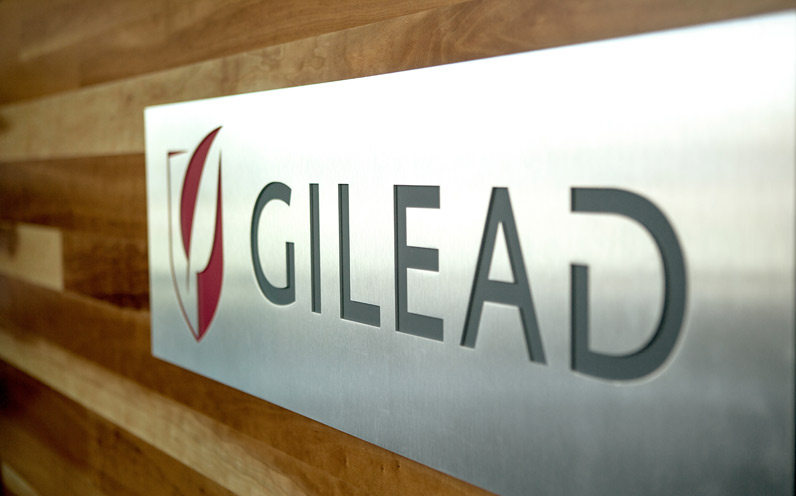
Gilead Sciences
- Headquarters: Foster City, Calif.52-week price range: $58.81 - $110.64Market capitalization: $164.3 billionP/E ratio: 4010-year annualized total return: 28.1%
Fast-growing Gilead Sciences (GILD) has become one of the drug industry's biggest stars over the past few years, thanks to soaring sales of its treatments for hepatitis and HIV—two major viral disease scourges. Not surprisingly, that has made the stock hugely popular with socially responsible investors. Measured in dollars, Gilead is the largest drug holding of socially responsible mutual funds, and it’s tied with blue-chip Johnson & Johnson in terms of the number of funds that own it (33).
But the decision to add Gilead or keep it in a portfolio hasn't been automatic for some socially responsible funds. One troubling issue has been the high price of the company's drugs, particularly its new hepatitis C treatment, Sovaldi. The 12-week regimen costs $84,000, a price that has aggravated health insurers. "This is one we've really had to think through," says Jerry Dodson, head of the San Francisco-based Parnassus Funds, which is a large shareholder of Gilead. But ultimately Parnassus, which has an investment philosophy that takes into account ethical business practices, decided that the potential global benefit of Sovaldi outweighed the pricing issue. Gilead has also offered a concession: In September, it announced a plan to provide the drug at deeply discounted prices in 91 developing countries.
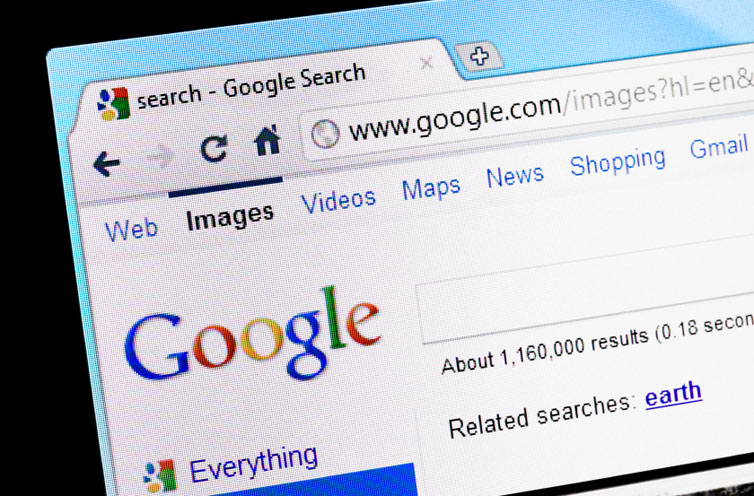
- Headquarters: Mountain View, Calif.52-week price range: $421.91 - $615.05Market capitalization: $404.8 billionP/E ratio: 3110-year annualized total return: 25.9%
When your corporate motto is "Don't be evil," you tell the world what to expect from your conduct. And investors clearly believe that Google (GOOGL) walks the walk: Mutual funds that focus on socially responsible companies owned a combined $759 million worth of Google's Class A and Class C shares , the funds' single largest corporate stake behind Apple, according to Morningstar.
The search-engine giant says its mission is to "organize the world’s information and make it universally accessible and useful." But being in control of that information also gives the company enormous power that could easily be abused. Google's commitment to Web freedom is a major attraction for socially responsible investors. "We've loved their leadership on censorship issues," says Freeman, of Calvert Funds. "At the same time, they've got some real [data] privacy issues," he says. "But nobody knows that better than they do. The test of a good company is how it deals with problems."
Another test is how it treats its various stakeholders. Google gets high marks for its workplace culture and its philanthropy. In 2013, it gave $1.1 billion in cash, products and services to charities, tying with Wal-Mart Stores for fourth place among the 150 largest U.S. companies by sales, according to the Chronicle of Philanthropy.

Johnson Controls
- Headquarters: Milwaukee52-week price range: $39.42 - $52.50Market capitalization: $30.2 billionP/E ratio: 2210-year annualized total return: 10.7%
Every large company has to decide whether, and how, to play up its social responsibility policies. For industrial parts and services firm Johnson Controls (JCI), "Sustainability" is the second button at the top of its Web site, right after "Products & Solutions." There's a good reason for the company's emphasis on sustainability, which among other things considers a firm's broad effects on the environment: Johnson, which began as a thermostat maker in 1885, now is a leading provider of energy management products and services that make offices, factories and other facilities run more efficiently. It also is a major manufacturer and recycler of lead-acid batteries and a large producer of other auto parts, including seats and instrument panels.
The company said it realized about 10 years ago that it was too timid about taking a public leadership role on environmental and safety issues. That's when it began to be more transparent about its efforts and started working toward making sustainability a "day-to-day" business strategy. One payoff from its sustainability focus is that Johnson's shares were owned by 29 socially responsible mutual funds as of midyear, making it one of the most popular industrial stocks among SRI funds. The company's business success, meanwhile, has translated into an unbroken stream of cash dividend payments to shareholders for 127 years.
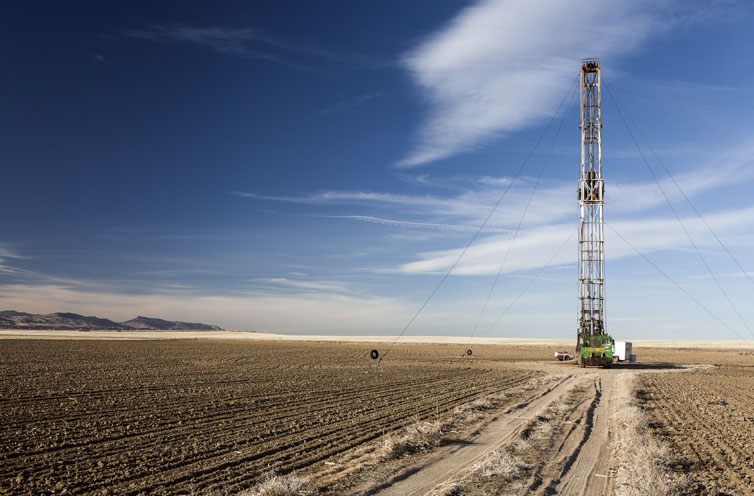
National Oilwell Varco
- Headquarters: Houston52-week price range: $65.53 - $86.55Market capitalization: $33.9 billionP/E ratio: 1410-year annualized total return: 18.7%
- One socially responsible argument in favor of National Oilwell Varco is that its products, such as well blowout preventers, are critical for worker and environmental safety in the drilling process. The company also has worked with charities in Africa and elsewhere in the developing world to provide thousands of solar-powered pumps that deliver drinkable water in remote areas. And in 2013, when the Motley Fool investing Web site evaluated 1,700 public U.S. companies based on how they treated investors, customers, workers and the world at large, National Oilwell Varco was among the 40 or so finalists for the title of “Best Company in America.”
Relatively few fossil fuel-related energy companies make the cut with socially responsible investors, typically because of pollution concerns and other environmental issues. National Oilwell Varco (NOV) is an exception. The company, built via more than 200 acquisitions over the years, is the dominant global producer of oil and gas drilling equipment. It also has become the most-owned energy-related stock in socially responsible mutual funds, showing up in 30 portfolios.
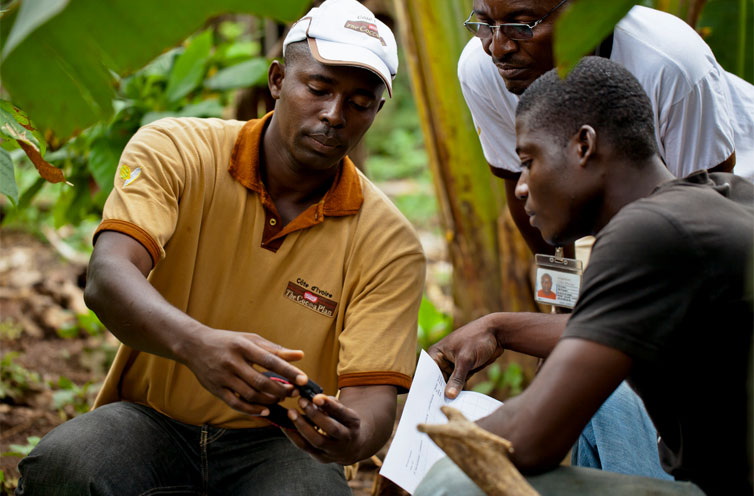
Nestle
- Headquarters: Vevey, Switzerland52-week price range: $66.55 - $80.65Market capitalization: $236.9 billionP/E ratio: 1810-year annualized total return: 14.4%
The biggest companies also make the biggest targets for groups pushing social change. But when the global anti-poverty outfit Oxfam International in 2013 graded the world's 10 largest food and beverage firms for their social and environmental policies, the results may have surprised some investors: The No. 1 company by sales, Swiss giant Nestle (NSRGY), scored highest on Oxfam's scale measuring corporate policy in seven areas "critical to sustainable agricultural production": women, small-scale farmers, farm workers, water, land, climate change and transparency. Nestle's score of 38 out of a possible 70 beat rivals including Unilever (34), Coca-Cola (29) and Kellogg (16). In an Oxfam update in February of this year, Nestle's score rose to 45 out of 70, and it remained in first place.
In describing its corporate values, Nestle said it’s guided by "our fundamental belief that for a company to be successful over the long term and create value for shareholders, it must also create value for society." Talking doesn't necessarily mean doing, of course, and socially responsible investors concede that measuring companies' efforts is far harder than simply assessing their stated policies. Still, strong public declarations of social responsibility provide investors with leverage to use in pushing firms for more improvement.
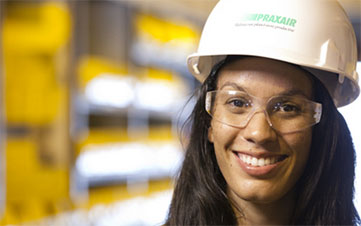
Praxair
- Headquarters: Danbury, Conn.52-week price range: $117.54 - $135.24Market capitalization: $39.1 billionP/E ratio: 2210-year annualized total return: 13.7%
Industrial gases producer Praxair's (PX) logo is a deep green color, and apparently not by accident: The company has long touted itself as intensely focused on environmental concerns. CEO Steve Angel insists that environmental responsibility and social responsibility are “core values” embedded in its corporate culture. Newsweek lent support to that claim in June when it ranked Praxair 30th on its annual list of America’s greenest companies. The publisher judged the 500 largest public corporations in the U.S. by yardsticks such as energy productivity, waste productivity and water productivity.
The company's Web site is filled with information on pro-environmental strategies, including how to reduce carbon gases and how to manage sustainable development. Socially responsible investors have been drawn to Praxair in droves: The stock can be found in 30 socially responsible mutual funds and was SRI funds' 12th-largest holding overall in dollars.

Qualcomm
- Headquarters: San Diego52-week price range: $65.47 - $81.97Market capitalization: $127.8 billionP/E ratio: 1910-year annualized total return: 8.2%
By one measure, no company is more popular with socially responsible investors than wireless technology leader Qualcomm (QCOM): Its shares are in 44 socially responsible fund portfolios, the broadest ownership of any stock, according to Morningstar. Qualcomm's allure stems from its critical role in the spread of wireless communications worldwide. The 29-year-old company's technology is at the heart of cellular phones, including Apple's new iPhone 6. Socially responsible investors are drawn to the huge boost in human knowledge and advancement driven by wireless communications around the globe. "A cell phone is a precursor to wealth," says Domini Social Investments’ Amy Domini.
Qualcomm plays up social-progress expectations for new hires. "'Change the world' is part of the job description," the company says on its Web site recruiting page. And the firm has a track record of treating its 27,000 employees very well. "They have a really good culture," says Dodson, of the Parnassus Funds, which counts Qualcomm among its largest holdings.
But one threat to Qualcomm's image looms: China has been investigating the company for alleged violations of Chinese anti-monopoly laws. Some media reports characterize the probe as a blatant shakedown for money and technology. However it's resolved, it will be a key test of Qualcomm's reputation.

T. Rowe Price Group
- Headquarters: Baltimore52-week price range: $70.96 - $85.74Market capitalization: $21.0 billionP/E ratio: 1610-year annualized total return: 13.6%
- T. Rowe also scores high in Morningstar's evaluation of the company's overall "stewardship" of its fund investors' dollars. Morningstar's stewardship grades measure fund companies' strengths in five areas: corporate culture, fund board quality, manager incentives, fees and regulatory history. In a report issued in March, Morningstar gave just four fund companies its highest overall stewardship grade of "A": American Funds, Dodge & Cox, Vanguard Group and T. Rowe. Of the four, only T. Rowe is a publicly traded company.
Investment management companies face different tests of social responsibility than consumer-products companies. Instead of making something you consume, money managers provide an ongoing service that, if they're investing intelligently and charging you fair fees, should boost your chances of being financially secure in the long run. On that score, no-load mutual fund company T. Rowe Price Group (TROW) has racked up a strong track record: Over the past 10 years (through June 30), 84% of the company's funds have outperformed their category averages, according to Morningstar. That has fueled strong small-investor inflows to the firm, particularly in retirement accounts. Assets were a record $738 billion at midyear, up from $400 billion at the end of 2007.

Xylem
- Headquarters: Rye Brook, N.Y.52-week price range: $26.98 - $40.00Market capitalization: $6.8 billionP/E ratio: 17Annualized total return since inception*: 17.7%
Xylem's (XYL) corporate slogan is "Let's Solve Water," and that's the company's sole focus. The business was spun off from conglomerate ITT Corp. in 2011 as a developer and manufacturer of products that move, clean and measure water: pumps, valves, sensors, filters and other devices. The company's name derives from the Greek word for the tissue that transports water in plants. Given socially responsible investors' concerns about the future of fresh water worldwide, Xylem has a natural shareholder constituency among them—provided it also meets their financial expectations.
One shareholder is the Parnassus Funds group. Xylem "has the investment characteristics that we require for our holdings," says Minh T. Bui, senior research analyst at Parnassus. Those characteristics include a strong management team, competitive advantages over rivals, "reasonable" share valuation and robust environmental, social and governance policies, he says. He regards Xylem's product lineup as "one of the strongest in the industry."
*October 2011

More from Kiplinger
- Headquarters: Rye Brook, N.Y.52-week price range: $26.98 - $40.00Market capitalization: $6.8 billionP/E ratio: 17Annualized total return since inception*: 17.7%
Xylem's (XYL) corporate slogan is "Let's Solve Water," and that's the company's sole focus. The business was spun off from conglomerate ITT Corp. in 2011 as a developer and manufacturer of products that move, clean and measure water: pumps, valves, sensors, filters and other devices. The company's name derives from the Greek word for the tissue that transports water in plants. Given socially responsible investors' concerns about the future of fresh water worldwide, Xylem has a natural shareholder constituency among them—provided it also meets their financial expectations.
One shareholder is the Parnassus Funds group. Xylem "has the investment characteristics that we require for our holdings," says Minh T. Bui, senior research analyst at Parnassus. Those characteristics include a strong management team, competitive advantages over rivals, "reasonable" share valuation and robust environmental, social and governance policies, he says. He regards Xylem's product lineup as "one of the strongest in the industry."
*October 2011
Profit and prosper with the best of Kiplinger's advice on investing, taxes, retirement, personal finance and much more. Delivered daily. Enter your email in the box and click Sign Me Up.

-
 How Much It Costs to Host a Super Bowl Party in 2026
How Much It Costs to Host a Super Bowl Party in 2026Hosting a Super Bowl party in 2026 could cost you. Here's a breakdown of food, drink and entertainment costs — plus ways to save.
-
 3 Reasons to Use a 5-Year CD As You Approach Retirement
3 Reasons to Use a 5-Year CD As You Approach RetirementA five-year CD can help you reach other milestones as you approach retirement.
-
 Your Adult Kids Are Doing Fine. Is It Time To Spend Some of Their Inheritance?
Your Adult Kids Are Doing Fine. Is It Time To Spend Some of Their Inheritance?If your kids are successful, do they need an inheritance? Ask yourself these four questions before passing down another dollar.
-
 Dow Leads in Mixed Session on Amgen Earnings: Stock Market Today
Dow Leads in Mixed Session on Amgen Earnings: Stock Market TodayThe rest of Wall Street struggled as Advanced Micro Devices earnings caused a chip-stock sell-off.
-
 Nasdaq Slides 1.4% on Big Tech Questions: Stock Market Today
Nasdaq Slides 1.4% on Big Tech Questions: Stock Market TodayPalantir Technologies proves at least one publicly traded company can spend a lot of money on AI and make a lot of money on AI.
-
 Fed Vibes Lift Stocks, Dow Up 515 Points: Stock Market Today
Fed Vibes Lift Stocks, Dow Up 515 Points: Stock Market TodayIncoming economic data, including the January jobs report, has been delayed again by another federal government shutdown.
-
 Stocks Close Down as Gold, Silver Spiral: Stock Market Today
Stocks Close Down as Gold, Silver Spiral: Stock Market TodayA "long-overdue correction" temporarily halted a massive rally in gold and silver, while the Dow took a hit from negative reactions to blue-chip earnings.
-
 Nasdaq Drops 172 Points on MSFT AI Spend: Stock Market Today
Nasdaq Drops 172 Points on MSFT AI Spend: Stock Market TodayMicrosoft, Meta Platforms and a mid-cap energy stock have a lot to say about the state of the AI revolution today.
-
 S&P 500 Tops 7,000, Fed Pauses Rate Cuts: Stock Market Today
S&P 500 Tops 7,000, Fed Pauses Rate Cuts: Stock Market TodayInvestors, traders and speculators will probably have to wait until after Jerome Powell steps down for the next Fed rate cut.
-
 S&P 500 Hits New High Before Big Tech Earnings, Fed: Stock Market Today
S&P 500 Hits New High Before Big Tech Earnings, Fed: Stock Market TodayThe tech-heavy Nasdaq also shone in Tuesday's session, while UnitedHealth dragged on the blue-chip Dow Jones Industrial Average.
-
 Dow Rises 313 Points to Begin a Big Week: Stock Market Today
Dow Rises 313 Points to Begin a Big Week: Stock Market TodayThe S&P 500 is within 50 points of crossing 7,000 for the first time, and Papa Dow is lurking just below its own new all-time high.
